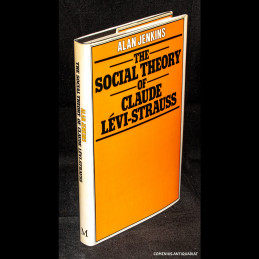Jenkins, A.,
The Social Theory of Claude Lévi-Strauss. London et al.: Macmillan, 1979. VI, 193 Seiten mit Literaturverzeichnis und Register. Leinen mit Schutzumschlag. 223 x 145 mm. 370 g
Bestell-Nr.159388 | ISBN: 0-333-23527-4
Jenkins |
Biographien Sozialwissenschaften |
Claude Levi Strauss |
Soziologie |
Philosophie
Alan Jenkins systematically examines in his book the ideas of the famous contemporary French anthropologist and philosopher Claude Lévi-Strauss. By tackling the theoretical roots of his distinctive modes of interpretation of social phenomena he assesses the basis and foundation of the 'structural' orientation of social theory which has become popular in social sciences in recent years.
Alan Jenkins argues that previous assessments of Lévi-Strauss have failed to examine the theoretical rigour of his major concepts in the requisite depth.
Each of the three major areas of concern in Lévi-Strauss's work are examined in turn: first his attempts to provide a methodological programme for social theory using language as a paradigm; secondly his attempt to solve many outstanding difficulties in the understanding of 'primitive' social institutions; and finally his attempt to achieve a scientific grasp of sets of collective ideas or representations like myths.
For Alan Jenkins the concepts Lévi-Strauss uses in analysis in these areas, although providing significant advances, also entail certain difficulties which lead to ultimate analytical restriction. By pointing out the foundations of these difficulties he moves to a clearer under- standing of what can be accepted and what rejected in Lévi-Strauss's work.
Contents
Acknowledgements vi
INTRODUCTION 1
PART ONE
Anthropology as a Semiology: Lévi-Strauss's Methodological Protocols 4
I The Nature of the Social as an Object of Knowledge 9
II The Epistemological Justification of structural Method 21
III Conclusion 37
PART TWO
Structural Anthropology, Primitive Social Organisation and History 39
I Lévi-Strauss's Concept of 'Society' and of 'Primitive' Societies 41
II The Structures, Mechanisms and Functions of the Kinship 'Level' 44
III An Integrated Critique 74
IV Conclusion: Society and History 88
PART THREE
Ideology and 'Mythic Thought': The Structural Interpretation of Symbolic Representations 94
I The Structural Interpretation of Ideological Systems: Totemism and Mythology 96
II The 'Science of the Concrete' and the Unity of Ideology 148
III Conclusion 154
CONCLUSION 156
Notes 163
Bibliography 175
Index 189






 frais de transport
frais de transport
 Google Mail
Google Mail
